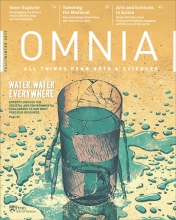The Global Neighborhood
Whether it’s our local Philadelphia community or the tiny Himalayan country of Bhutan, we share our most basic need and universal challenge: water. Access to safe drinking water, warming oceans, and, as made all-too-clear in recent months, strong infrastructure and storm protection are among the top concerns communities face. And they all have one thing in common: They are studied by faculty and students at Penn Arts and Sciences.
From a social science angle, access to clean water and the battle against lead exposure are closely linked to economic status. When it comes to the study of rising waters, myriad branches of the physical sciences offer essential investigatory methods. And, more and more, using the tools of the humanities—the written word, theater, film, and visual art—to communicate the stakes of these challenges is central to creating public understanding and a sense of urgency. Our cover story, “Water, Water Everywhere”, is a deep dive into these complex challenges.
Another feature, “Arts and Sciences in Action”, applies this multi-pronged approach to issues within the global community. With this in mind, Making a Difference in Diverse Communities and Global Inquiries are new Penn Arts and Sciences programs that encourage faculty to explore innovative ways of applying their expertise and working with students to address societal challenges. The initiatives provide funding to support teams of faculty and students in multidisciplinary projects that combine coursework, research, and service to address issues of diversity and inequality at the local, national, and international level.
Whether it’s reclaiming stories at a United Nations refugee camp in Kenya using video and virtual reality projects, or working with key stakeholders across southeastern Pennsylvania to develop and implement a program that will enhance efforts to eliminate lead exposure, these projects are pushing the boundaries of how a university can be a resource to the global community to effect change.
In this issue, our experts explore the idea of race and national identity through a study of second-generation Nigerians and Spanish history and examine how traditional and modern medicine intertwine to impact global health. Our faculty opinion feature takes on another large-scope challenge in “Fairness in the Criminal Justice System”.
Penn Arts and Sciences is also doubling down on its belief that civil discourse is paramount to community. This commitment is affirmed by the launch of the Andrea Mitchell Center for the Study of Democracy, which will provide an unparalleled platform for students, faculty, and a broad public audience to explore some of society’s most pressing concerns.
Penn Arts and Sciences remains steadfast in its engagement with the issues that impact individuals of all backgrounds and aspirations, and OMNIA will continue to share with you, our audience, the innovative solutions our researchers are bringing to bear.



